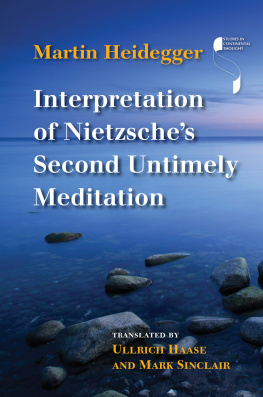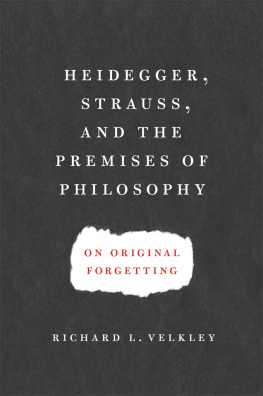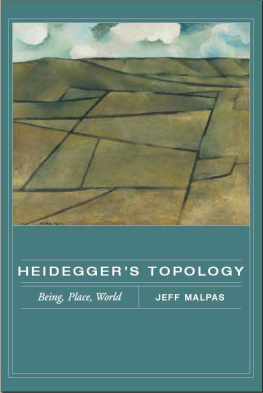
The Beginning of Western Philosophy
Studies in Continental Thought
EDITOR
JOHN SALLIS
CONSULTING EDITORS
Robert Bernasconi
Rudolf Bernet
John D. Caputo
David Carr
Edward S. Casey
Hubert L. Dreyfus
Don Ihde
David Farrell Krell
Lenore Langsdorf
Alphonso Lingis
William L. McBride
J. N. Mohanty
Mary Rawlinson
Tom Rockmore
Calvin O. Schrag
Reiner Schrmann
Charles E. Scott
Thomas Sheehan
Robert Sokolowski
Bruce W. Wilshire
David Wood
Martin Heidegger
The Beginning of Western Philosophy
Interpretation of Anaximander and Parmenides
Translated by
Richard Rojcewicz
Indiana University Press
Bloomington and Indianapolis
This book is a publication of
Indiana University Press
Office of Scholarly Publishing
Herman B Wells Library 350
1320 East 10th Street
Bloomington, Indiana 47405 USA
iupress.indiana.edu
Published in German as Martin Heidegger, Gesamtausgabe 35: Der Anfang der abendlndischen Philosophie, Auslegung des Anaximander und Parmenides,
ed. Peter Trawny
2012 by Vittorio Klostermann GmbH, Frankfurt am Main
English translation 2015 by Indiana University Press
All rights reserved
No part of this book may be reproduced or utilized in any form or by any means, electronic or mechanical, including photocopying and recording, or by any information storage and retrieval system, without permission in writing from the publisher. The Association of American University Presses Resolution on Permissions constitutes the only exception to this prohibition.
The paper used in this publication meets the minimum requirements of the American National Standard for Information SciencesPermanence of Paper for Printed Library Materials, ANSI Z39.481992.
Manufactured in the United States of America
Library of Congress Cataloging-in-Publication Data
Heidegger, Martin, 18891976.
[Anfang der abendlndischen Philosophie. English]
The beginning of western philosophy : interpretation of Anaximander and Parmenides / Martin Heidegger ; translated by Richard Rojcewicz.
pages cm. (Studies in continental thought)
Published in German as Martin Heidegger, Gesamtausgabe 35: Der Anfang der abendlndischen Philosophie, Auslegung des Anaximander und Parmenides, ed. Peter Trawny 2012 by Vittorio Klostermann GmbH, Frankfurt am Main.
Includes bibliographical references.
ISBN 978-0-253-01553-2 (cloth : alk. paper) ISBN 978-0-253-01561-7 (ebook)
1. Anaximander. 2. Parmenides. 3. Pre-Socratic philosophers. I. Title.
B208.Z7H4413 2015
182'.3dc23
2014028442
1 2 3 4 5 20 19 18 17 16 15
CONTENTS
Translators Introduction
This is a translation of a lecture course Martin Heidegger offered in the summer semester of 1932 at the University of Freiburg. The German original appeared posthumously in 2012 as volume 35 of the philosophers Gesamtausgabe (Complete Works).
The editor, in his afterword, identifies the sources he drew on to compose the text. These sources are varied, and the book at times does consequently display unevenness. Not everything is expressed in full sentences, and some few passages are quite cryptic. I did not attempt to alter the diction, for example by supplying tacitly understood verbs. The translation is meant to read to an English ear the way the original does to a German one.
This is the first of the Gesamtausgabe volumes to provide the pagination of Heideggers manuscript. These numbers are placed in the outer margin, with a vertical line to mark the page break. All cross-references in the book are to the manuscript page numbers. The running heads correspond to the Gesamtausgabe pagination.
I used square brackets ([]) throughout the book for my insertions into the text, and the few footnotes I introduced are marked Trans. Braces ({ }) are reserved for the editors interpolations. German-English and English-German glossaries can be found in the back matter and invite the reader to pursue linguistic connections I was unable to capture. Heidegger himself translates here all the extant fragments of Anaximander and Parmenides, obviating the need for a Greek-English lexicon. Even someone without facility in ancient Greek should have little trouble following the thread of Heideggers inimitable interpretation of these two so-called pre-Socratics.
Richard Rojcewicz
The Beginning of Western Philosophy
P ART O NE
The dictum of Anaximander of Miletus, 6th5th century
Introduction
1. The mission and the dictum
a) Cessation and beginning
[1] Our mission: the cessation of philosophizing?
We want to seek out the beginning of Western philosophy (cf. p. 31!).Western philosophy takes its start in the 6th century BC with the Greeks, a minor, relatively isolated, and purely self-dependent(??) people. The Greeks of course knew nothing of the Western and the West. These terms express a primarily geographical concept, contrasted against the East, the Oriental, the Asiatic. At the same time, however, the rubric Western is a historiological concept and signifies todays European history and culture, which were inaugurated by the Greeks and especially by the Romans and which were essentially determined and borne by Judeo-Christianity.
Had the Greeks known something of this Western future, a beginning of philosophy would never have come about. Rome, Judaism, and Christianity completely transformed and adulterated the inceptuali.e., Greekphilosophy.
b) The dictum in the customary translations
We want to seek out the beginning of Western philosophy. What we find therein is little. And this little is incomplete. The tradition ordinarily calls Thales of Miletus the first philosopher. Much is reported about him and his teaching. But nothing is handed down directly.
After Thales, Anaximandros (ca. 610545) is called the second philosopher. Preserved for us are a few of his words and statements. The one reads:
.
From Simplicius (Commentary on the Physics) based on Theophrastus ( ).
In translation: But whence things take their origin, thence also proceeds their passing away, according to necessity; for they pay one another penalty and retribution for their wickedness according to established time. Diels.
Whence things have their origination, thence must they also perish, according to necessity; for they must pay retribution and be judged for their injustices, according to the order of time. Nietzsche.
____________
. Cf. berlegung II, 89. {In: berlegungen IIVI. GA [Gesamtausgabe] 94.}
. [Archaic form of Being, to render das Seyn, archaic form of das Sein.Trans.]
. {Simplicii in Aristotelis Physicorum libros quattuor priores commentaria. Edidit H. Diels. Berlin: Reimer, 1882. Phys. 1:2, 24. Cf. also Die Fragmente der Vorsakratiker. Griechisch und Deutsch von Hermann Diels. Vol. 1, 4th. ed. Berlin: Weidmann, 1922. Heidegger underlines the words . Diels has a comma after .}
. {This translation is not in Diels. The 4th edition of Die Fragmente der Vorsokratiker reads: But whence their birth is, thence also proceeds their dying, according to necessity. For they pay one another penalty and retribution for their wickedness according to the order of time. Cf. also the afterword to Heideggers Der Spruch des Anaximander, GA78, 339ff.}
. {Friedrich Nietzsche, Die Philosophie im tragischen Zeitalter der Griechen. In Nietzsches Werke: Gesamtausgabe in Grooktav,
Next page
















